Table of Contents
The Rise of Smart Homes: From Sci-Fi to Reality – How Smart Homes Became Mainstream
Not too long ago, the idea of talking to your home and having it respond felt like something straight out of a sci-fi movie. But today, smart homes are no longer a futuristic dream — but a reality. With AI-driven automation, energy-efficient systems, and voice-controlled assistants, homes are getting smarter by the day.
Why the Smart Home Revolution is Happening Now
Several factors have fueled the rise of smart homes:
- Advancements in AI & IoT – Devices are now interconnected, learning user habits, and making intelligent decisions.
- Growing Demand for Sustainability – As energy costs rise and climate concerns grow, homeowners are embracing energy-efficient solutions.
- Convenience & Security – From remotely controlling your thermostat to monitoring your home in real time, smart homes offer unprecedented convenience and safety.
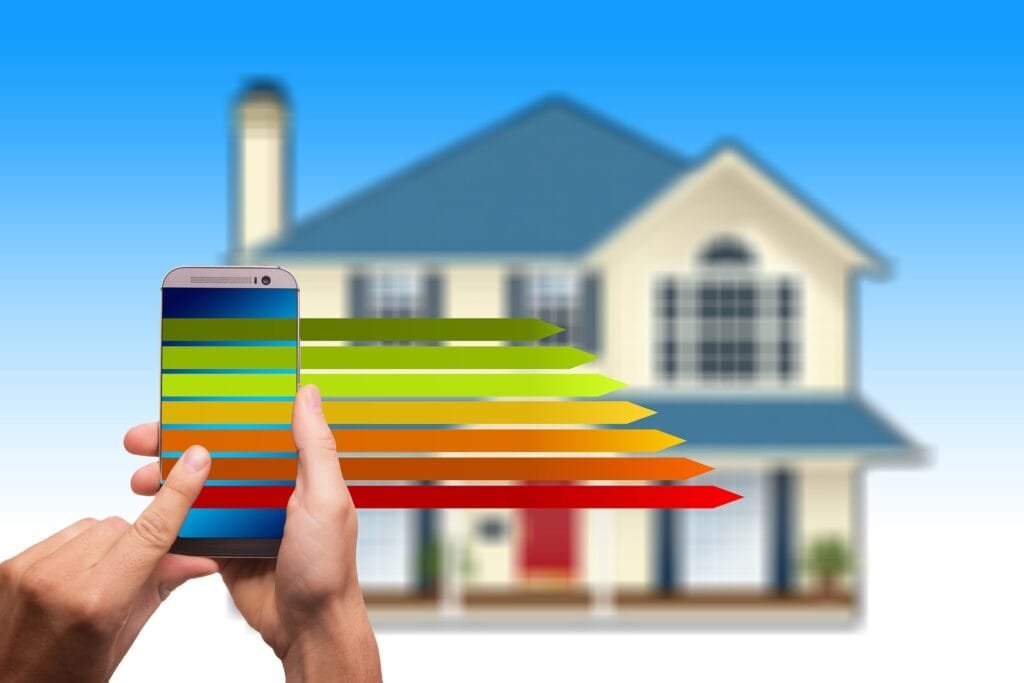
The Intersection of AI, Automation & Sustainability
The future of smart homes isn’t just about cool gadgets — it’s about creating eco-friendly, self-sustaining homes that adapt to our needs. AI-powered automation is making homes more energy-efficient, reducing waste, and even lowering utility bills. In this article, we’ll explore how AI, automation, and sustainability are shaping the smart homes of tomorrow.
What Are Smart Homes?
Defining a Smart Home: More Than Just Gadgets
A smart home isn’t just a house filled with cool gadgets — it’s an interconnected ecosystem where devices communicate, automate tasks, and adapt to your lifestyle. At its core, a smart home uses technology to enhance convenience, efficiency, and security while making daily living easier.
Key Features of a Smart Home
What makes a home smart? It’s all about integration. Here are the key components:
- Smart Assistants & Voice Control – Think Alexa, Google Assistant, or Siri, managing everything from lights to music.
- Home Automation Systems – Devices like thermostats, security cameras, and smart plugs that operate based on schedules, motion, or voice commands.
- Energy Efficiency & Sustainability – Smart thermostats, solar integration, and automated lighting help reduce energy waste.
- Enhanced Security – Smart locks, video doorbells, and motion sensors provide real-time monitoring and protection.
- AI & Machine Learning – Homes that learn your habits and optimize your experience automatically.
The Evolution of Smart Homes: Past vs. Present
- Then: Early smart homes were limited to timers on lights and simple remote controls.
- Now: AI-driven automation allows devices to make intelligent decisions based on user behavior.
- Future: Full integration with renewable energy, predictive AI, and self-sustaining smart grids.
From convenience to sustainability, the rise of smart homes is redefining how we live. And with AI leading the way, the best is yet to come!
AI & Automation: The Brain Behind the Smart Home
How AI is Powering the Smart Home Revolution
Artificial Intelligence (AI) is no longer a sci-fi fantasy — it’s the backbone of modern smart homes. AI-driven automation is transforming how we interact with our living spaces, making homes smarter, more efficient, and even more predictive. Whether it’s your thermostat learning your schedule or your fridge reminding you to buy milk, AI is quietly revolutionizing home life.
Smart Assistants: The Personal AIs Running Your Home
The likes of Amazon Alexa, Google Assistant, and Apple Siri are more than just voice-controlled speakers. They’re evolving into full-fledged AI-powered home managers.
- They control lighting, heating, and security with simple voice commands.
- They learn your routines — like adjusting the thermostat before you even wake up.
- They integrate with multiple devices, creating a seamless smart ecosystem.
Predictive Automation: Homes That Learn & Adapt
AI isn’t just about following orders — it’s about anticipating your needs.
- Smart thermostats (like Nest & Ecobee) analyze your habits to optimize energy use.
- Automated lighting adjusts based on time of day and occupancy.
- Smart fridges track food inventory and suggest recipes based on what’s inside.
The result? A home that adapts to your lifestyle without constant manual adjustments.
AI & Security: Smarter, Safer Homes
Security is one of the biggest benefits of AI-powered smart homes.
- AI-enhanced cameras detect unusual activity and differentiate between family members, pets, and intruders.
- Smart locks & facial recognition add an extra layer of security.
- Automated alerts notify homeowners instantly of potential threats.
Your home isn’t just smart — it’s actively protecting you 24/7.
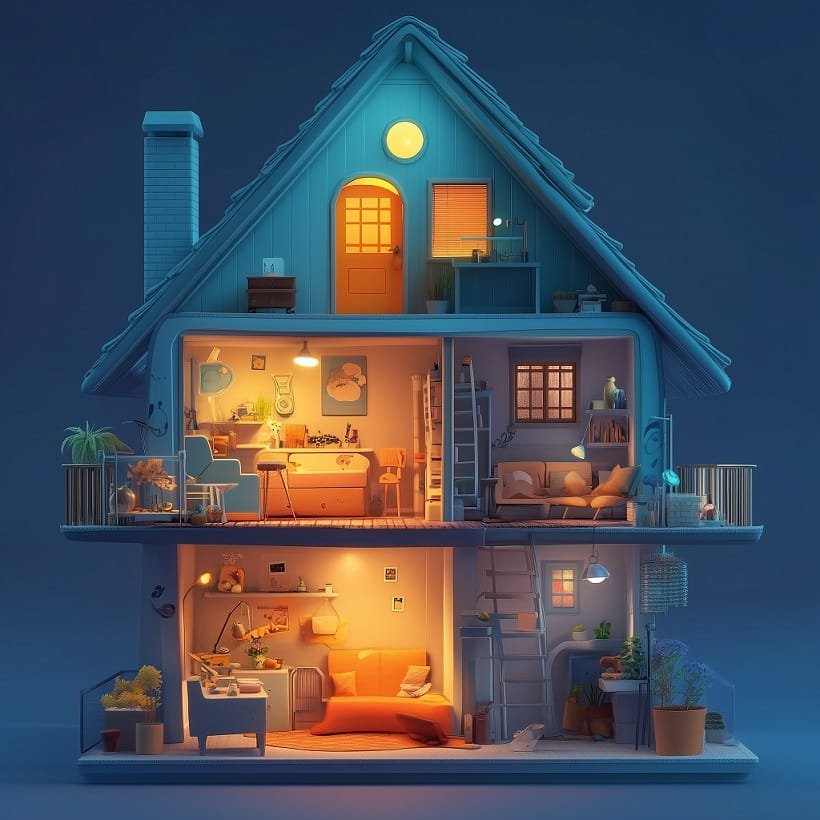
The Future of AI in Smart Homes
So what’s next?
- Fully autonomous homes that adjust everything without human input.
- AI-driven energy management that optimizes electricity use in real time.
- Advanced robotics handling chores like cleaning, cooking, and even companionship.
AI and automation are reshaping the modern home, making life easier, safer, and more energy-efficient. And this is only the beginning.
Sustainability in Smart Homes
Eco-Friendly Smart Homes: The Future of Sustainable Living
Smart homes aren’t just about convenience — they’re also playing a major role in reducing energy waste, lowering carbon footprints, and promoting sustainable living. Thanks to AI and automation, homeowners can now optimize their energy usage, conserve water, and even produce their own renewable power.
Energy-Efficient Smart Devices: Cutting Waste, Saving Money
From smart thermostats to energy-monitoring plugs, today’s smart home tech is designed to cut down on excess energy consumption.
- Smart thermostats (Nest, Ecobee, etc.) adjust heating and cooling based on real-time weather and user habits.
- Energy-monitoring plugs track how much power appliances use and suggest ways to cut waste.
- Smart LED lighting dims or turns off when no one is in the room, slashing electricity bills.
With AI handling the settings, homeowners can reduce energy waste without even thinking about it.
Renewable Energy & Smart Homes: A Perfect Match
Smart home technology pairs beautifully with solar panels, wind turbines, and home battery systems to maximize renewable energy use.
- Solar energy panels can connect to smart grids, allowing homeowners to store excess energy or sell it back to the power company.
- Smart battery storage (like Tesla Powerwall) ensures homes have backup energy for nighttime use.
- Wind generators can supplement energy production, further reducing dependence on fossil fuels.
The combination of smart tech + renewable energy is a game-changer for sustainability.
Smart Water Management: Every Drop Counts
Water conservation is another key component of eco-friendly smart homes.
- Smart irrigation systems (like Rachio) adjust watering schedules based on real-time weather, preventing overwatering.
- Leak-detecting sensors notify homeowners about hidden leaks before they become a costly disaster.
- Smart showers & faucets track water usage and help homeowners reduce unnecessary waste.
Less water wasted means lower bills and a healthier planet.
Reducing Household Waste with Smart Tech
Smart home systems also contribute to zero-waste living by helping homeowners cut down on unnecessary waste.
- Smart fridges track expiration dates and suggest recipes to reduce food waste.
- AI-powered composting bins (like Lomi) turn food scraps into usable compost.
- Automated recycling assistants help sort and properly dispose of different materials.
With smart tech, sustainability becomes effortless.
The Smart, Sustainable Home of the Future
What’s next for eco-friendly smart homes?
- AI-driven energy-sharing neighborhoods, where homes exchange excess renewable power.
- Carbon-neutral smart buildings, designed to produce as much energy as they consume.
- Self-sustaining smart homes, using AI to manage water, power, and waste autonomously.
Smart technology isn’t just making homes more convenient — it’s making them greener, cleaner, and more sustainable for the future.
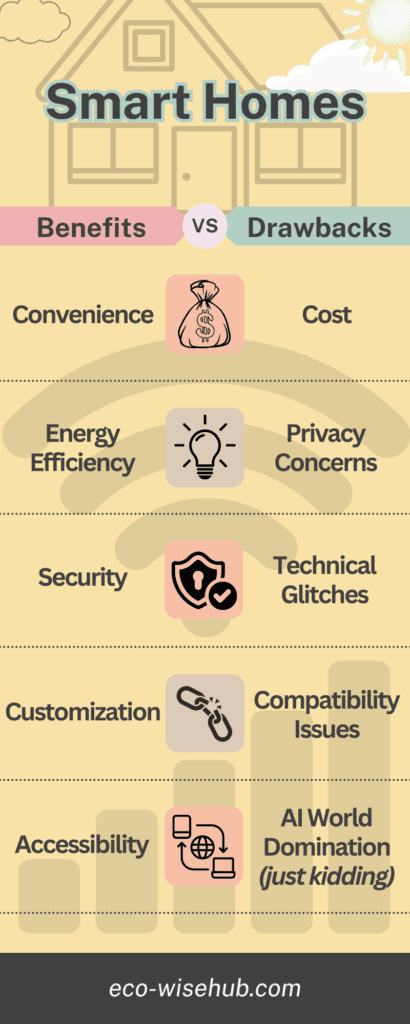
The Benefits of Smart Homes
Smart homes aren’t just about having cool gadgets and voice-activated lights (although, let’s be honest, that part is pretty fun). They bring a host of real-world benefits, making life easier, safer, more efficient, and even more eco-friendly. Let’s break down the key advantages.
Convenience & Comfort: A Home That Works for You
Imagine waking up in the morning, and instead of fumbling for the light switch, your smart home automatically adjusts the blinds, starts brewing your coffee, and plays your favorite morning playlist. Sounds like a dream, right?
- Voice-controlled assistants (Alexa, Google Assistant, Siri) let you control your home hands-free.
- Automated schedules adjust lighting, temperature, and appliances to match your daily routine.
- Remote control from anywhere means you can adjust your thermostat or check your security cameras while on vacation.
In short, smart homes think for you, giving you more time to focus on what matters.
Energy Efficiency & Cost Savings: Save Money While Saving the Planet
Smart homes aren’t just smart — they’re money-saving machines. By optimizing energy use, they help homeowners slash electricity and water bills while reducing environmental impact.
- Smart thermostats cut heating and cooling costs by up to 20%.
- LED smart bulbs use up to 80% less energy than traditional bulbs.
- Smart irrigation systems prevent water waste, lowering monthly bills.
With real-time energy tracking, you can see where your money is going and make smarter choices.
Security & Safety: Protecting What Matters Most
Smart home technology has taken home security to the next level. Whether you’re at work, on vacation, or just chilling on the couch, smart security systems keep an eye on things for you.
- Smart locks allow you to lock/unlock doors remotely and grant temporary access to guests.
- AI-powered security cameras detect unusual activity and send alerts to your phone.
- Smart smoke & carbon monoxide detectors provide instant alerts and even notify emergency services.
With these features, your home becomes a digital fortress, giving you peace of mind 24/7.
Health & Well-Being: A Smarter Way to Live
Your home can also play a role in keeping you healthy and comfortable.
- Smart air purifiers monitor and improve indoor air quality.
- AI-driven sleep monitors help you optimize your sleep patterns.
- Smart kitchen devices track food expiration dates to reduce food waste and promote healthier eating.
With a smarter, healthier living space, you feel better, sleep better, and live better.
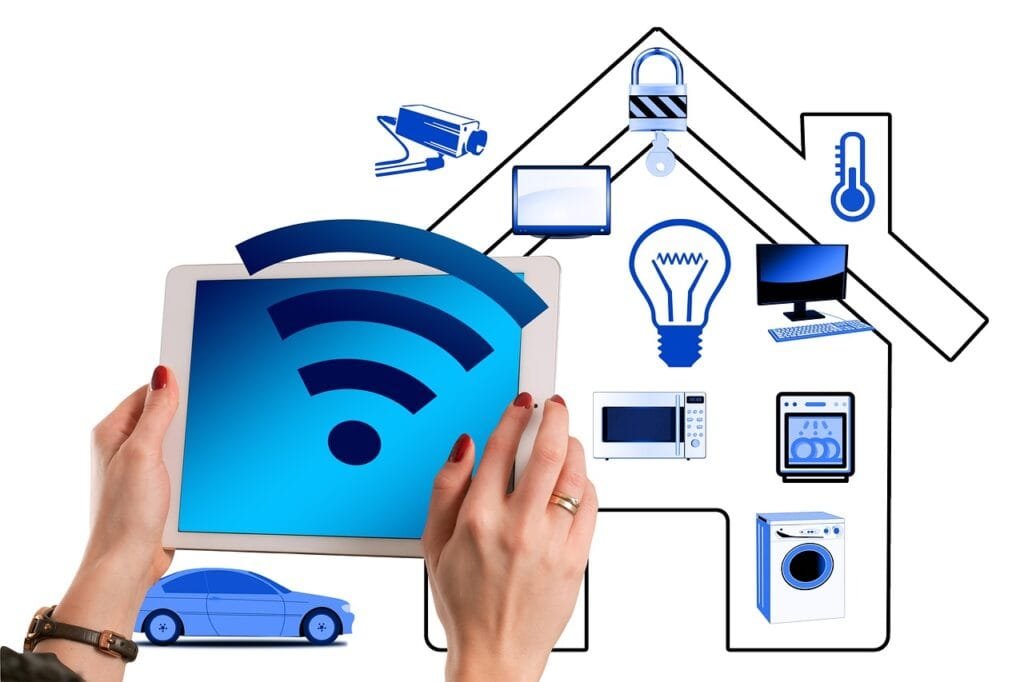
Resale Value & Future-Proofing: A Smart Investment
A smart home isn’t just about making life easier today — it’s also a solid investment for the future.
- Homes with smart tech sell faster and at higher prices than traditional homes.
- Smart upgrades (like thermostats, security systems, and lighting) increase property value.
- Future-proofing ensures your home stays up-to-date with the latest advancements.
Whether you’re planning to sell your home or just want to enhance your lifestyle, investing in smart technology pays off in the long run.
The Bottom Line: Smart homes save time, save money, boost security, and improve your quality of life—all while being better for the planet. What’s not to love?
The Rise of Smart Homes: Challenges & Concerns
Smart homes sound like the ultimate dream — convenience, energy savings, and AI that makes life easier. But like any technological advancement, they come with their own set of challenges. Before you go all-in on automation, let’s take a look at some key concerns that homeowners should keep in mind.
Privacy & Security Risks: Who’s Watching Your Home?
The same tech that makes life easier can also open the door (literally) to hackers if not properly secured.
- Smart cameras, voice assistants, and connected devices collect data — sometimes more than you realize.
- Hackers can exploit security vulnerabilities to access cameras, locks, and even personal information.
- Voice-activated assistants constantly listen — and sometimes record more than they should.
Solution? Always use strong passwords, enable two-factor authentication (2FA), and keep devices updated to prevent cyber threats.
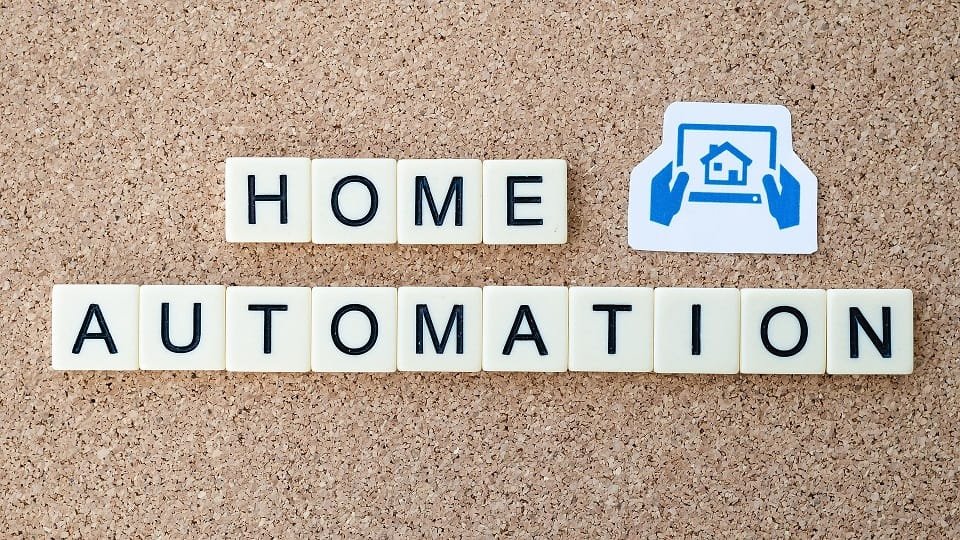
Cost: A Pricey Investment Upfront
While smart homes save money in the long run, the initial cost of setting up a fully automated home can be steep.
- High-quality smart thermostats, security systems, and lighting come with a premium price tag.
- Some devices require subscription fees for full functionality (e.g., cloud storage for security cameras).
- Professional installation for complex systems (like smart locks or whole-home automation) can add to the cost.
Solution? Start small—invest in one or two smart devices and expand gradually. Many budget-friendly options are available!
Technology Dependence: When Smart Becomes… Not So Smart
Relying too much on automation means that when something goes wrong, everything goes wrong.
- Power outage? Your smart lights and thermostat won’t work.
- Wi-Fi down? Say goodbye to voice commands and remote access.
- Software glitches? Devices might randomly malfunction or disconnect.
Solution? Keep some manual backups (like regular light switches and traditional locks) and use devices that have offline functionality when possible.
Compatibility Issues: When Devices Don’t Speak the Same Language
Not all smart home gadgets play well together — some brands use different systems, making integration a hassle.
- Amazon Alexa vs. Google Assistant vs. Apple HomeKit — which one should you choose?
- Older homes may need electrical upgrades to support certain smart systems.
- Some devices require brand-specific hubs, adding extra cost and complexity.
Solution? Stick to one ecosystem (Alexa, Google, or Apple) and check device compatibility before purchasing.
Environmental Impact: Is Smart Tech Truly Sustainable?
Ironically, while smart homes promote sustainability, they also contribute to electronic waste and energy consumption.
- Frequent software updates make older devices obsolete faster.
- Non-recyclable materials in smart devices contribute to landfill waste.
- Manufacturing and shipping smart gadgets leave a carbon footprint.
Solution? Choose energy-efficient devices, opt for brands that offer recycling programs, and buy only what you truly need.
Final Thoughts: Are Smart Homes Worth It?
Smart homes offer undeniable benefits—from energy savings to convenience and security. But it’s important to weigh the challenges and make informed choices. With proper security measures, gradual investment, and eco-conscious purchasing, smart homes can be both practical and sustainable.
What’s Next? The Future of Smart Homes
The Rise of Smart Homes. The smart home industry is rapidly evolving, with new technologies reshaping how we live, work, and interact with our spaces. As AI and automation advance, smart homes will become more intuitive, sustainable, and seamlessly integrated into our daily lives. Here’s a look at what the future holds.
AI-Powered Homes: Learning and Adapting to Your Lifestyle
Artificial Intelligence (AI) will take smart homes to the next level by learning habits and preferences to optimize comfort and efficiency.
- Hyper-personalized automation—your home will adjust lighting, temperature, and security based on your routines.
- Predictive AI will anticipate needs, like ordering groceries when supplies are low.
- Advanced voice assistants will move beyond simple commands to hold context-aware conversations.
What to Expect? AI will turn smart homes into truly intelligent assistants, automating tasks before you even ask.
Energy-Smart Homes: The Rise of Self-Sustaining H
Future homes will be designed to generate and manage their own energy, reducing reliance on traditional power grids.
- Smart solar panels and wind turbines will automatically adjust to weather conditions.
- AI-powered energy management will track usage and shift power to where it’s needed most.
- Smart grids will allow homes to sell excess energy back to the grid, making homeowners “energy producers.”
What to Expect? Smart homes will cut energy costs, reduce carbon footprints, and promote sustainability.
The Internet of Everything: A Fully Connected Home
The Internet of Things (IoT) will expand, allowing all devices to communicate seamlessly.
- Smart kitchens will suggest recipes based on fridge inventory.
- Wearable tech will sync with home environments, adjusting lighting and climate based on your mood and health.
- Biometric security (facial recognition, fingerprint scanning) will replace traditional locks.
What to Expect? A fully connected lifestyle where everything in your home works together effortlessly.
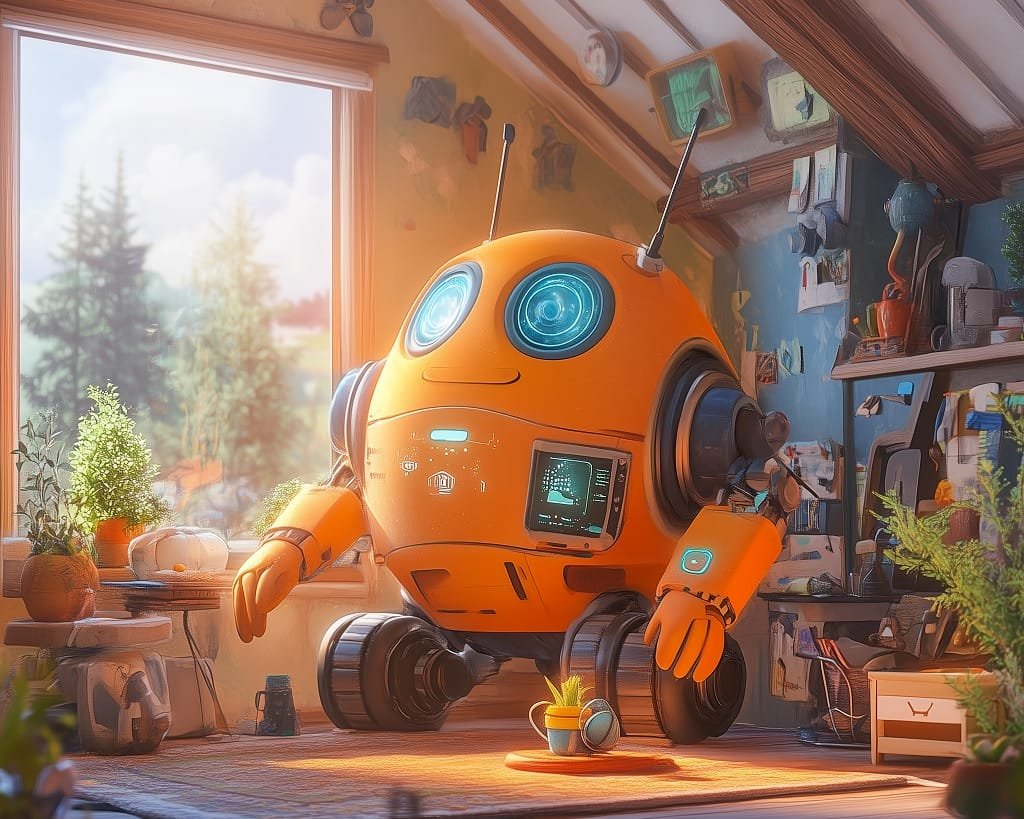
Robots & Automation: The Next Step in Convenience
We’ve seen robot vacuums — but the future will bring more advanced home robots that do much more.
- AI-driven home assistants will handle cleaning, cooking, and organization.
- Smart drones may be used for security and package deliveries.
- Automated furniture will adapt to different needs (e.g., beds that fold away to create more space).
What to Expect? A world where home maintenance requires minimal effort, thanks to intelligent automation.
Sustainable Smart Homes: Eco-Friendly Living at Its Best
Future smart homes will take green living to a whole new level.
- Self-sustaining homes with recycled water systems and vertical gardens.
- Biodegradable smart materials that reduce construction waste.
- AI-powered waste management systems that sort recyclables and compost automatically.
What to Expect? The future home will not just be smart—it will be eco-conscious and self-sufficient.
Final Thoughts: Are You Ready for the Future?
Smart homes are just getting started. With AI, automation, and sustainability leading the way, the homes of tomorrow will be smarter, more efficient, and more intuitive than ever.
Would you embrace a fully AI-powered home, or do you prefer a balance between tech and tradition?
Conclusion: Are Smart Homes the Future?
As technology continues to evolve, smart homes are no longer a futuristic dream—they are becoming a reality. AI-driven automation, sustainable energy solutions, and interconnected devices are transforming the way we live, making homes more convenient, efficient, and eco-friendly than ever before.
But are smart homes truly the future? The answer depends on how well they balance innovation with real-world practicality. While they offer unmatched comfort and efficiency, concerns like privacy, cost, and energy consumption still need to be addressed.
What’s clear is that the shift toward smarter living is inevitable. With ongoing advancements in AI, automation, and sustainability, future homes will continue to evolve, offering customized, energy-smart, and highly adaptive living environments.
Are You Ready for the Smart Home Revolution?
Whether you’re already using smart devices or just exploring the possibilities, now is the perfect time to embrace the future of home technology. Start small — maybe with smart lighting or energy-efficient systems — and see how smart home tech can enhance your daily life.

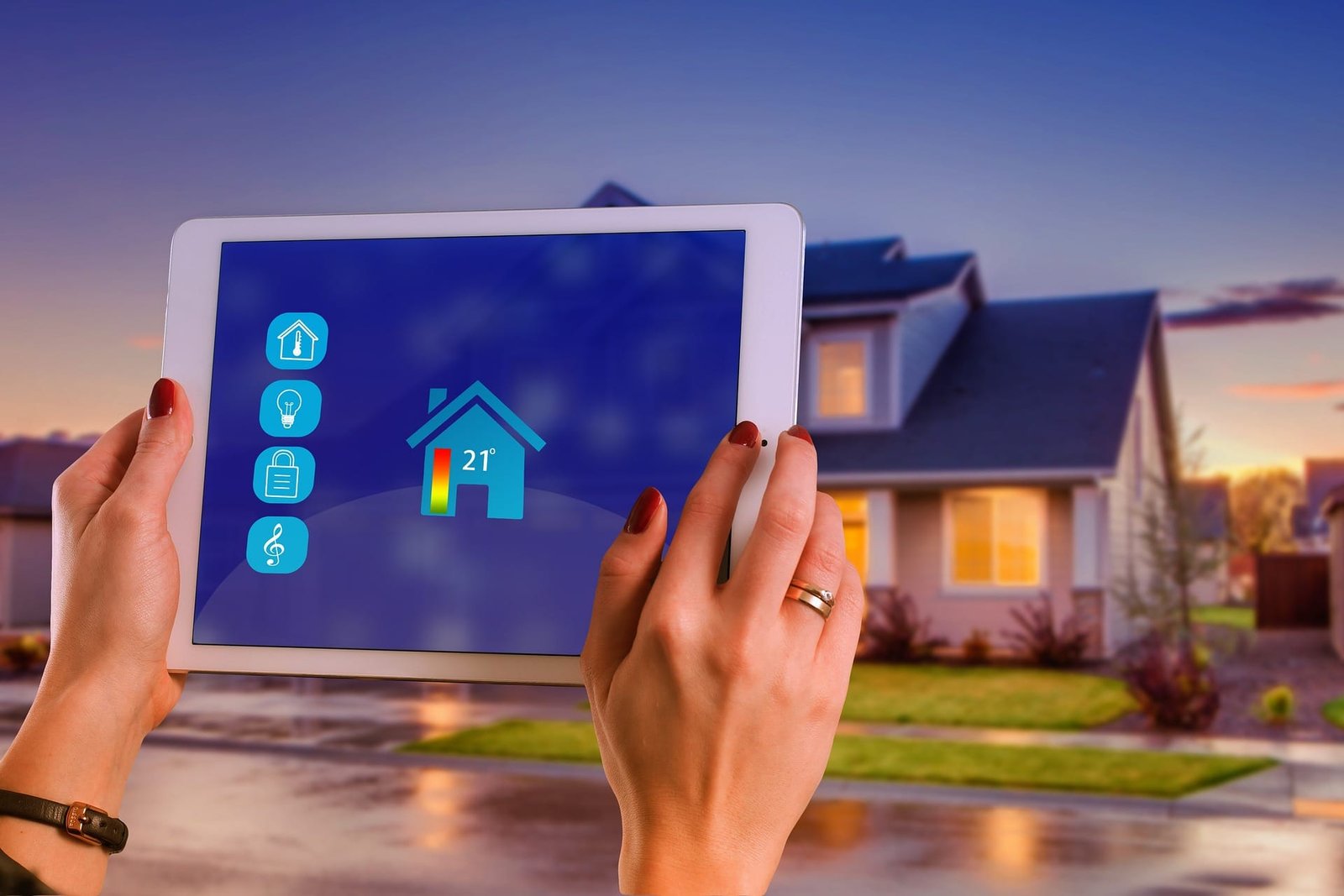

Pingback: Solar Power 101: How it Works and Why It’s the Future - Eco-Wise Hub
Pingback: Sustainable Home 101: Simple Swaps for a Greener, Cleaner Life - Eco-Wise Hub